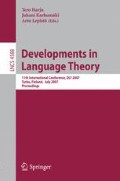Abstract
We generalise existing forward and backward bisimulation minimisation algorithms for tree automata to weighted tree automata. The obtained algorithms work for all semirings and retain the time complexity of their unweighted variants for all additively cancellative semirings. On all other semirings the time complexity is slightly higher (linear instead of logarithmic in the number of states). We discuss implementations of these algorithms on a typical task in natural language processing.
This work was partially supported by NSF grant IIS-0428020.
Access this chapter
Tax calculation will be finalised at checkout
Purchases are for personal use only
Preview
Unable to display preview. Download preview PDF.
References
Hopcroft, J.E.: An n log n algorithm for minimizing states in a finite automaton. In: Kohavi, Z. (ed.) Theory of Machines and Computations, Academic Press, London (1971)
Meyer, A.R., Stockmeyer, L.J.: The equivalence problem for regular expressions with squaring requires exponential space. In: Proc. 13th Annual Symp. Foundations of Computer Science, pp. 125–129. IEEE Computer Society, Los Alamitos (1972)
Gramlich, G., Schnitger, G.: Minimizing nfas and regular expressions. In: Diekert, V., Durand, B. (eds.) STACS 2005. LNCS, vol. 3404, pp. 399–411. Springer, Heidelberg (2005)
Milner, R.: A Calculus of Communicating Systems. Springer Verlag, Heidelberg (1982)
Berstel, J., Reutenauer, C.: Recognizable formal power series on trees. Theoretical Computer Science 18, 115–148 (1982)
Gécseg, F., Steinby, M.: Tree Automata. Akadémiai Kiadó (1984)
Gécseg, F., Steinby, M.: Tree languages. In: Rozenberg, G., Salomaa, A. (eds.) Handbook of Formal Languages, vol. 3, pp. 1–68. Springer Verlag, Heidelberg (1997)
Eilenberg, S. (ed.): Automata, Languages, and Machines. Pure and Applied Mathematics, vol. A.59. Academic Press, London (1974)
Buchholz, P.: Bisimulation relations for weighted automata (unpublished, 2007)
Högberg, J., Maletti, A., May, J.: Backward and forward bisimulation minimisation of tree automata. Technical Report ISI-TR-633, U. So. California (2007)
Kozen, D.: On the Myhill-Nerode theorem for trees. Bulletin of the EATCS 47, 170–173 (1992)
Borchardt, B.: The Myhill-Nerode theorem for recognizable tree series. In: Ésik, Z., Fülöp, Z. (eds.) DLT 2003. LNCS, vol. 2710, pp. 146–158. Springer Verlag, Heidelberg (2003)
Drewes, F., Vogler, H.: Learning deterministically recognizable tree series. J. Automata, Languages and Combinatorics (to appear, 2007)
Högberg, J., Maletti, A., May, J.: Bisimulation minimisation of weighted tree automata. Technical Report ISI-TR-634, U. So. California (2007)
Paige, R., Tarjan, R.: Three partition refinement algorithms. SIAM Journal on Computing 16, 973–989 (1987)
Abdulla, P.A., Kaati, L., Högberg, J.: Bisimulation minimization of tree automata. In: Ibarra, O.H., Yen, H.-C. (eds.) CIAA 2006. LNCS, vol. 4094, pp. 173–185. Springer, Heidelberg (2006)
Borchardt, B.: The Theory of Recognizable Tree Series. Akademische Abhandlungen zur Informatik. Verlag für Wissenschaft und Forschung (2005)
Abdulla, P.A., Kaati, L., Högberg, J.: Bisimulation minimization of tree automata. Technical Report UMINF 06.25, Umeå University (2006)
Jelinek, F.: Continuous speech recognition by statistical methods. Proc. IEEE 64, 532–557 (1976)
Galley, M., Hopkins, M., Knight, K., Marcu, D.: What’s in a translation rule? In: Proc. HLT-NAACL, pp. 273–280 ( 2004)
Yamada, K., Knight, K.: A syntax-based statistical translation model. In: Proc. ACL, pp. 523–530. Morgan Kaufmann, San Francisco (2001)
Marcus, M.P., Marcinkiewicz, M.A., Santorini, B.: Building a large annotated corpus of english: The Penn treebank. Comp. Linguistics 19, 313–330 (1993)
Author information
Authors and Affiliations
Editor information
Rights and permissions
Copyright information
© 2007 Springer-Verlag Berlin Heidelberg
About this paper
Cite this paper
Högberg, J., Maletti, A., May, J. (2007). Bisimulation Minimisation for Weighted Tree Automata. In: Harju, T., Karhumäki, J., Lepistö, A. (eds) Developments in Language Theory. DLT 2007. Lecture Notes in Computer Science, vol 4588. Springer, Berlin, Heidelberg. https://doi.org/10.1007/978-3-540-73208-2_23
Download citation
DOI: https://doi.org/10.1007/978-3-540-73208-2_23
Publisher Name: Springer, Berlin, Heidelberg
Print ISBN: 978-3-540-73207-5
Online ISBN: 978-3-540-73208-2
eBook Packages: Computer ScienceComputer Science (R0)

